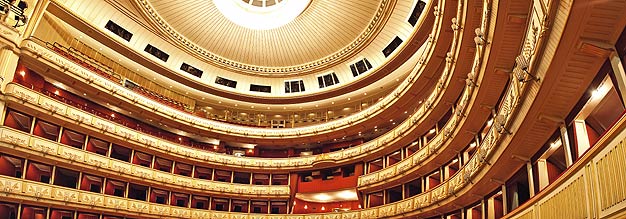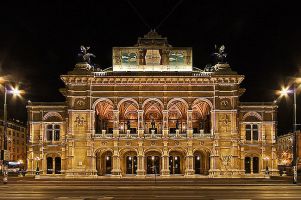- Available
- Limited
- Sold Out
Your Benefits With Us
Events in Vienna
Events in Salzburg
Popular Concerts & Operas
Event details
- Category: Operas
- Event: ANDREA CHÉNIER
- Date/Time: 09 January 2019 - 19:00
- Venue: Vienna State Opera
- Address: Opernring 2, 1010 Wien (Map)
- Other Dates: Show alternatives
TICKET CATEGORIES AND PRICES
No tickets available.Description
Giordano's opera takes place during the French Revolution. The poet Chénier, the noblewoman Maddalena and Carlo, a supporter of the revolution are entangled in a love triangle. Although Giordano's opera - tragically ending with the execution of the lovers Maddalena and Chénier - refers to a historical figure, the storyline is mainly imaginary. The opera premiered in 1896 in Milan at the Teatro alla Scala and was a huge success from the very first performance. Enthusiasm spread worldwide immediately. Still today, Giordano's masterpiece is considered as a major work of the operatic repertoire.
Act1
The palace of the Comtesse de Coigny is being prepared for a sumptuous soirée during the final days of the Ancien Régime. Charles Gérard, valet de chamber and son of the elderly gardner, vociferously expresses his hatred of aristocratic society and its superficial world. The Comtesse de Coigny appears with her daughter Madeleine (Maddalena), with whom Gérard is hopelessly in love. They are accompanied by Bersi, confidante and Abigail. The Comtesse reproaches her daughter, who has not yet dressed for the party. In conversation with Bersi, Madeleine discloses how tiresome she finds modern fashion and the foolish behavior of the aristocracy.
The guests start to arrive and the celebration commences. There is an entertainment in rococo style in which Pierre Fléville, a vainglorious novelist, and the abbé monopolise the conversation. Talk centres on the revolution which is allegedly imminent. However, nobody takes the matter very seriously. The young poet André (Andrea) Chénier, a guest of Fléville’s, is introduced. The Comtesse asks him to recite some of his poetry, but Chénier declines to do so. Madeleine makes a bet with her friends that she will be able to make André change his mind. She provokes him by expecting him to sing the praises of love. However, André’s reaction to this challenge is to extol his fatherland and the new principles of freedom and humanity in a harsh political accusation.
Chénier has caused a scandal, and the company is outraged. Only Madeleine and Gérard agree with Chénier. Inspired by André’s courageous song, Gérard leads a crowd of starving peasants into the salon. The peasants lament their fate. When the comtesse takes him to task, Gérard gets quite carried away and shocks her with slogans of the revolution. He accuses the comtesse of holding her celebrations at the expense of the poor and declares himself on the side of the oppressed. The comtesse dismisses Gérard on the spot. However, the party continues…
Act 2
The revolution has degenerated into Robespierre’s reign of terror. People live in fear of the Revolutionary Tribunal, the death sentence and the guillotine. Gérard has been promoted to the Chamber of Deputies. André, though he had previously extolled the ideals of the revolution, is now suspected of counter-revolutionary activities and is being watched by the police. Madeliene has taken refuge with Bersi, and she too is being persecuted. Gérard is still consumed by his unhappy love for her. In front of the Café Hottot near the Seine an incroyable, a police insormer charged with searching for Madeleine, is trying to provoke Bersi. The latter is obliged to walk the streets in order to be able to feed her former mistress. Half seriously, half cynically, Bersi pretends to be a real daughter of the revolution, maintaining that she feels quite at home in this Milieu. However, the incroyable becomes suspicious when he notices Bersi and André exchanging glances.
Chénier is joined by his friend Roucher, who advises him to leave the capital as quickly as possible as his name is already on the Public Prosecutor’s list. But André is bewildered by sparkling, anonymous letters from a mysterious lady which have awoken in him for the first time the feeling of true love, and refuses to leave the city. Roucher attempts to convince him that the letters can only come from a merveilleuse, one of the street-walkers of the time, and hands him a pass. André, however is determined to first find the writer of the letters. Bersi also begs him to wait for a lady who is in great danger. The incroyable, who has also been hired by Gérard to look for Madeleine, draws his own conclusions: Chénier – suspected of being a counter-revolutionary – has been receiving messages from Bersi, who, though reduced to being a street walker, was once Madelein’s confidante – and thus an aristocrat: André and Madeleine must therefore be conspirators.
André recognizes the lady whom Bersi has talked of as Madeleine, who also admits to being the author of the mysterious letters. She tells him how Bersi has sheltered her; however, now they are on her trail. She asks André for protection, although she knows that he, too, is in danger. The couple declare their love for one another. They swear to be faithful until death and decide to flee.
Suddenly Gérard appears, having been summoned by the incroyable, who has betrayed the couple. Roucher escapes with Madeleine. Chénier draws a dagger which he has concealed in his walking stick and wounds Gérard with it. The incroyable tries to pursue the fleeting couple, but Roucher threatens him with a pistol. Although he has been wounded, Gérard has not completely forgotten his previous sympathy for André, nor his frustrated love for Madeleine. He helps André to flee: “Protect Madeleine!” – however, Chénier’s name is already on the list of Public Prosecutor Fouquier-Tinville.
Act 3
In the Committee of Public Safety Matthieu stirs up the people against the enemies of the Regvolution, for the fatherland is endangered. In a fierce speech Gérard, who has recovered from his injury, calls on the people to be prepared to make sacrifices if necessary: the whole of Europe is against the French. The woman sacrifice their jewellery, the fathers their wages, the mothers – their sons. The old, blind Madelon is lead in by her grandson. Her son Roger, she says, fell in the storming of the Bastille and her eldest son lies buried near Valmy. She has now come to offer the services of the young boy leading her for the fatherland.
Whilst the exuberant crowd is dancing the carmagnole, the incroyable reports to Gérard that Chénier has been arrested at a friend’s house. He assures him that there is no need to worry about Madeleine: she will soon turn up of her own accord in the hope of rescuing her loved one. He asks Gérard to specify thee charge, as Fouquier-Tinville is waiting. Gérard realizes that the ideals of the revolution for which he fought – the noble intention of helping the poor and oppressed – have turned into depravity, lies and hate. Gérard is conscience-stricken, particularly as he himself – tormented by his frustrated love – has also become a traitor and maligner.
Madeleine turns up just as the incroyable predicted she would. Gérard confesses how much he loves her, and how much he has loved her ever since the time when they played together as children in the Palace Gardens. But the hoplessness of ever being able to possess her has made him betray Chénier. Madeleine rejects his renewed advances, saying she would rather face death. Then, as she despondently remembers her mother, who has been murdered, and the palace, which has been reduced to ashes, and Bersi, who has been selling herself for her sake, she offers Gèrard her own body in the hope of saving André. Gérard is deeply moved by this gesture. He declares his readiness to attempt a rescue of Chénier himself.
The crowd us enjoying the spectacle of tribunal trying alleged traitors to the revolution. They are akk executed without being given a chance to defend themselves. Only CHénier is given an opportunity of saying his last words, and defends himself valiantly. Gérard admits that he has betrayed him and wants to withdraw the charge. However, the crowd clamours for his death. André Chénier is condemned to death by the guillotine.
Act 4
In the courtyard of the prison of St. Lazare, which before the revolution was the monatery of Saint Vincent de Paul, André commits his last poem to paper. He sings the song to his friend Roucher, a prisoner like himself. It is a hymn to poetry, in whose arms he is about to die.
The jailor admits Madeleine, and Gérard to the prison. Gérard has obtained permission for Madeleine to talk to André for the last time. In return for gold and jewellery she persuades the jailor to let her take the place of Idia Legray, a prisoner condemned to death. Thus she will be able to perish at André’s side. Gérard, whose tragic love has made him agree to this fateful solution, is prepared to make one further attempt at rescue – the last: “Robespierre will have to help us!” Madeleine and André talk with one another for the last time. It is only a temporary parting, for both die in the certainty that after death they will be reunited in a new life. The jailor calls out two names: André Chénier and Idia Legray. Gérard’s last attempt at rescue has been in vain…






